| Official Name: | Federative Republic of Brazil |
| Official Language: | Portuguese |
| Area: | 8,515,767 km2 (3,287,956 sq mi) |
| Population: | 210,150,000 |
| Time Zone: | UTC−2/-3/-4/-5 |
| Capital City: | Brasilia |
| Elevation (São Paulo): | 66 m (217 ft) |
| Currency: | Brazilian Real (BRL) |
| Main Cities: | São Paulo, Rio de Janeiro, Brasilia |
| Main Port: | Port of Santos |
| Required Visa for Entry: | Nationals from Australia, Canada, EU countries, and the UK and others DO NOT require visas. Click here for more information concerning visa requirements. |
| Required vaccination for entry: | None |

Main Risks:
Theft, robbery, kidnapping, extortion, rape, drug and human trafficking, fraud, vehicle assault.
Executive Summary
Brazil features medium risks. Security risks increase considerably in impoverished and peripherical neighborhoods in urban areas, and also in remote and jungle zones removed from main localities. Due to risks posed by crime, we recommend procuring secure transportation services for business and high-profile trips. For the latter, we further advise procuring executive protection services.
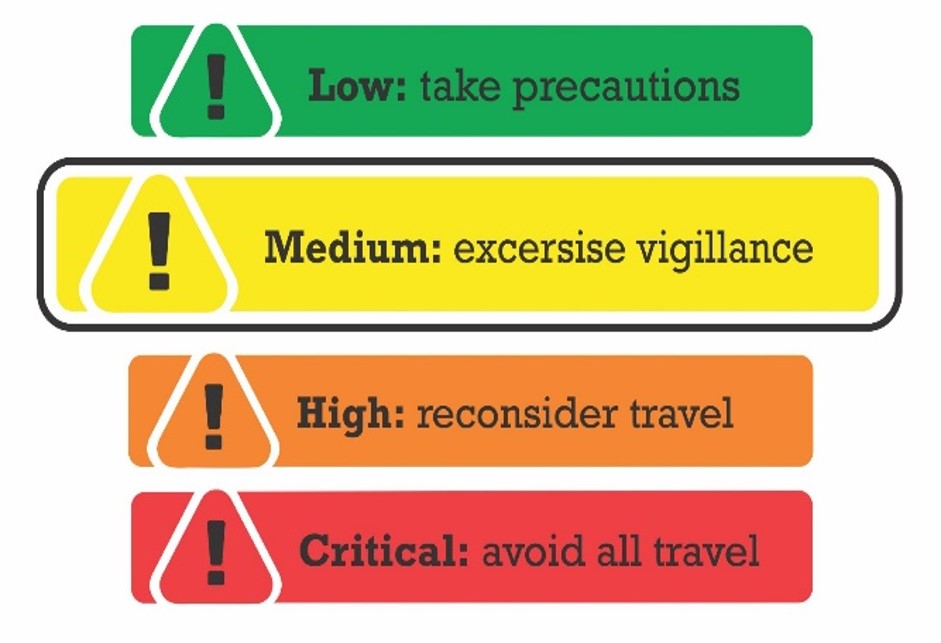
General Risk Level: MEDIUM.
The risk generally remains stable throughout the country. That said, for security reasons, we advise against all non-essential travel through impoverished and peripheral areas without secure transportation services. We recommend studying a security plan before traveling to Brazil.
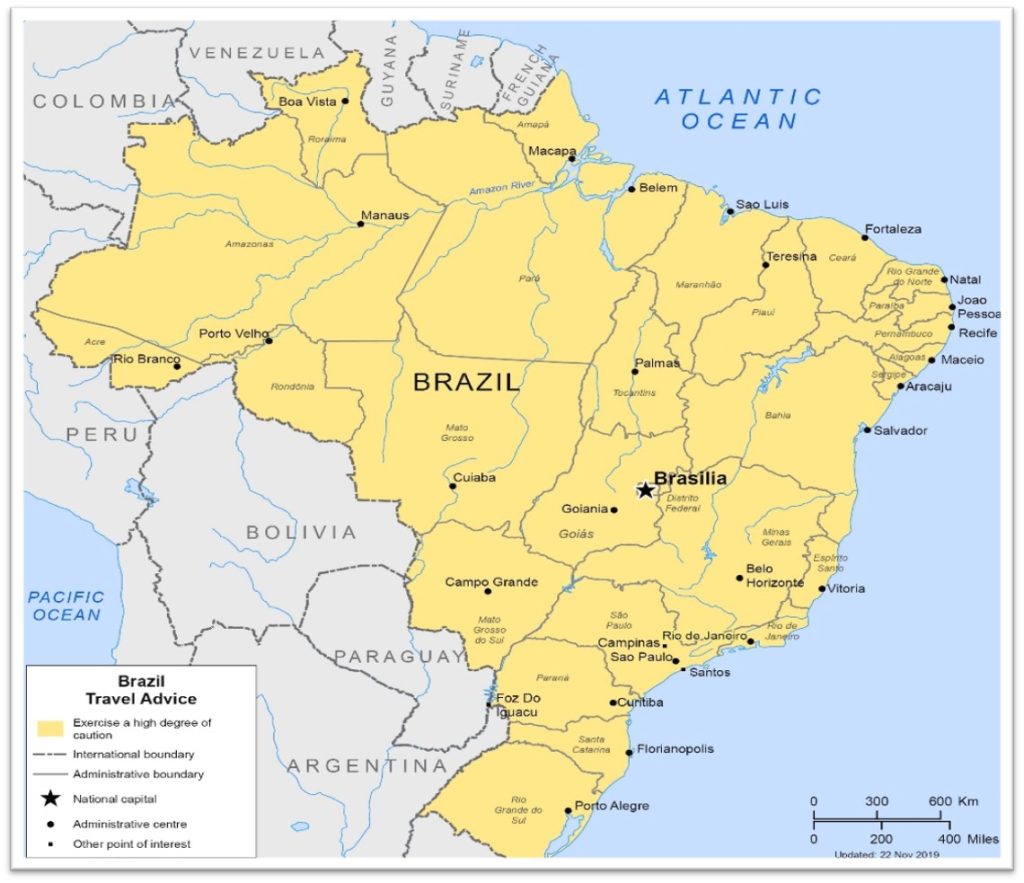
Crime and Security
The main threat to those visiting Brazil stems from opportunistic low and medium level crime. Violent incidents are known to take place even in centric and relatively safe areas in the most important cities, including São Paulo, Rio de Janeiro, and Brasilia. Criminals are usually armed and they have no qualms about threatening their victims at point-blank range. Many operate on motorbikes to promptly flee the scene after assaulting distracted passersby and drivers caught at a traffic standstill. Given this threat, visitors should remain cognizant of their surroundings and exercise constant vigilance.
Organized crime elements in Brazil commonly operate inside the so-called “favelas” (shanty towns), and their networks constitute a major threat to national security. The main groups in the country are the Comando Vermelho (CV), Primeiro Comando da Capital (PCC), and Amigos dos Amigos (ADA). Although these groups do not represent a direct threat to foreigners visiting the country, organized crime is usually behind sophisticated heists to steal large amounts of money or valuables. Moreover, these groups control drug-trafficking routes in Brazil’s sparsely populated border areas, which should thus be avoided. This advice does not apply to the Foz do Igúacu National Park in the border with Argentina.
Although some tour operators promote guided tours to certain favelas, as a precaution it is best not to enter or travel through impoverished neighborhoods. Rival armed gangs operate in favelas and precedent suggests they could potentially take part in shootouts as they struggle for influence. Furthermore, given that favelas are spread throughout cities, especially in Rio de Janeiro, it is essential to check GPS services before traveling to avoid passing through critical-risk areas. For instance, in 2016 an Italian biker, who had mistakenly entered the Prazeres favela in Rio de Janeiro, was killed by criminals who assumed their victim was a policeman. During another incident, in 2017 police shot and killed a Spanish tourist who was visiting the Rocinha favela in the same city. The event took place after the driver of the vehicle in which the tourist was traveling failed to stop at a security checkpoint. If anything, these cases illustrate the importance of avoided critical-and high-risk areas such as favelas.
Favelas are easily recognizable for the concentration of precarious hoses. That said, please note that in Brazil socioeconomic contrasts within some areas are quite stark. In certain sites favelas are located near well-off residential complexes, usually physically separated by walls or security barriers. For this reason, bear in mind that relatively secure sites can be a few meters apart from risk areas. As a rule of thumb, from a security standpoint, the most convenient places to lodge and carry out business transactions in cities are the main commercial areas, where major malls and hotels are located. These areas are usually guarded by private security elements 24/7.
Finally, remain cognizant that political protests in Brazil, especially those organized by left-wing unions and parties, oftentimes turn violent and unruly, leading to acts of vandalism and clashes. It is thus best to avoid the vicinity of any unfolding demonstration.
Security in Rio de Janeiro
Rio de Janeiro is generally considered somewhat unsafe due to high levels of criminal activity, even in relatively-safe areas. Victims are usually picked at random or among those perceived to be wealthy. For this reason, travelers should take caution and avoid attracting unnecessary attention to themselves. It is also paramount to avoid strolling along the beaches and public parks at night, when violent incidents, including sexual assault, are often reported. In any case, the safest and most convenient areas to lodge and carry out transactions are Flamengo, Botafogo, Copacabana, and Leblon. As a rule of thumb, the southern beach areas commonly gather Rio de Janeiro’s middle and upper classes. While it is still possible to stay and visit the central area, locally referred to as “Cinelândia”, near Praça Floriano (Square), note that risks posed by crime are higher.
Due to crime concerns and the fact that favelas are spread throughout town, we advise against traveling in public transportation, unless specifically knowledgeable about bus and metro networks. It will always be safer and convenient to resort to private drivers hired in advance. Taxis may be used in Rio de Janeiro but make sure they come recommended by the main hotels and are preferably booked in advance. For tourist trips, it is also feasible to use ride-sharing apps. Note that there are also informal taxis, but using them entails security risks.
Although some favelas are allegedly “pacified” by security forces or could be promoted as such, refrain from visiting impoverished areas. Traveling through main thoroughfares in the vicinity of favelas does not pose additional risks provided the traffic flow remains dynamic.
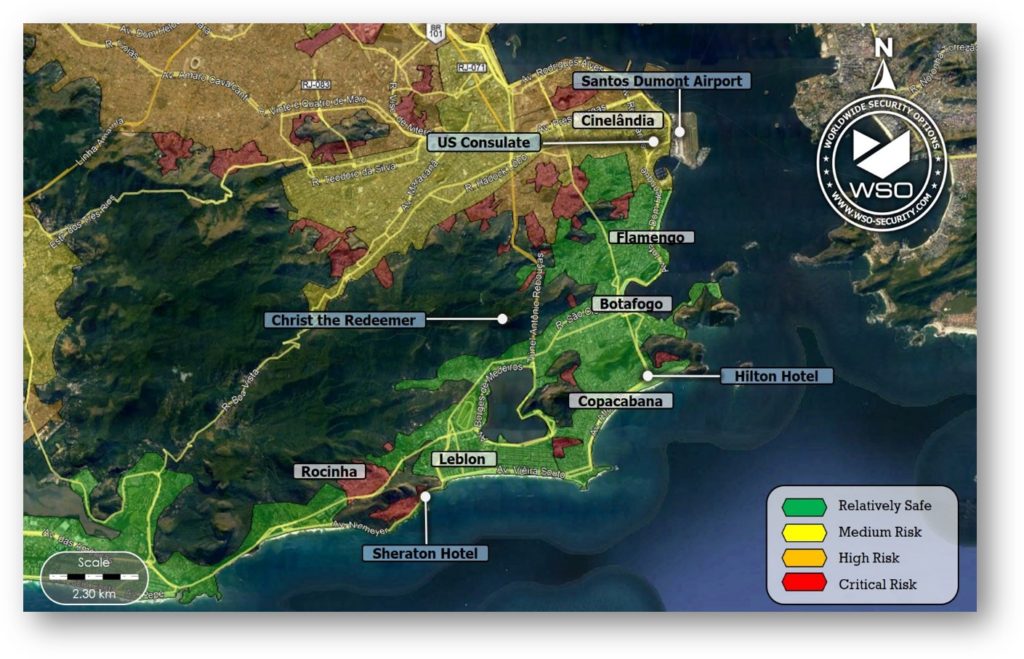
Rio de Janeiro has two commercial airports and one for private use. The Antônio Carlos Jobim International Airport (GIG), better known as Galeão, is the main international entry point into the city. It is located north of the central areas, approximately 20 kilometers away from Cinelândia. Under normal circumstances, travel between Copacabana and Galeão should last about 45 minutes. In turn, the Santos Dumont Airport (SDU) is located right next to the city center. It mostly serves regional and domestic routes. Finally, the Jacarepaguá-Roberto Marinho Airport (RRJ) is located in the Barra da Tijuca area, west of the city. It servers charter flights and helicopter services connecting the mainland with offshore oil platforms.

Security in São Paulo
São Paulo is a megacity that remains vulnerable to crime. Violent episodes are known to transpire even in relatively safe and central areas. However, unlike Rio de Janeiro, high and critical-risk areas are usually located in the periphery, apart from convenient residential and commercial neighborhoods. A notable exception is the Paraisópolis favela, located in the vicinity of relatively well-off residential areas. As a rule of thumb, avoid non-essential travel to peripheric neighborhoods, limiting activity in the city to centric and commercial areas. The best sites to stay and carry out transactions are Bela Vista, Jardins, Itam Bibi, Vila Olímpia, and Morumbi.
As it is the case in Rio de Janeiro, we advise against using public transportation unless knowledgeable of the city and the bus and metro network. While routes and highways bordering and crossing the city do not pose security risks, it is important to avoid detours or taking wrong turns into impoverished or peripheric neighborhoods. For business trips, it should always be convenient and safest to resort to reputable private transportation services.
The city has two commercial airports. The São Paulo – Governador André Franco Montoro International Airport (GRU), better known as Guarulhos, is of Latin America’s largest. It is located about 30 kilometers from the city center. Under normal conditions travel between the airport and the city center should take about 45 minutes. On the other hand, the Congonhas Airport (CGH) deals mostly with domestic flights. It is near relatively safe residential areas, including Morumbu and Vila Olímpia.
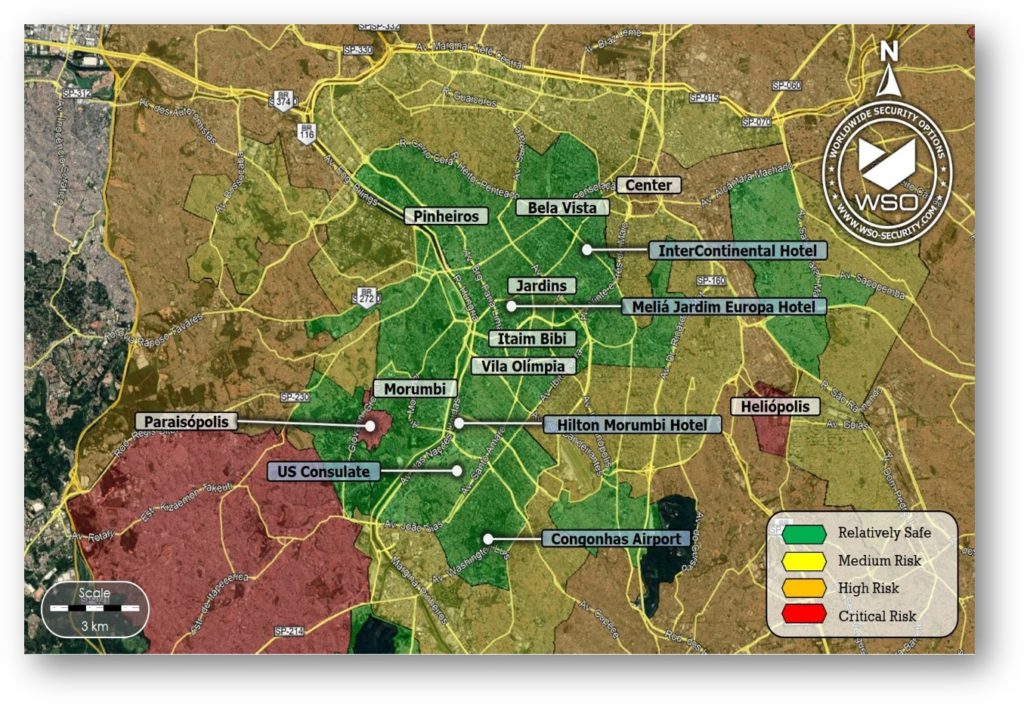
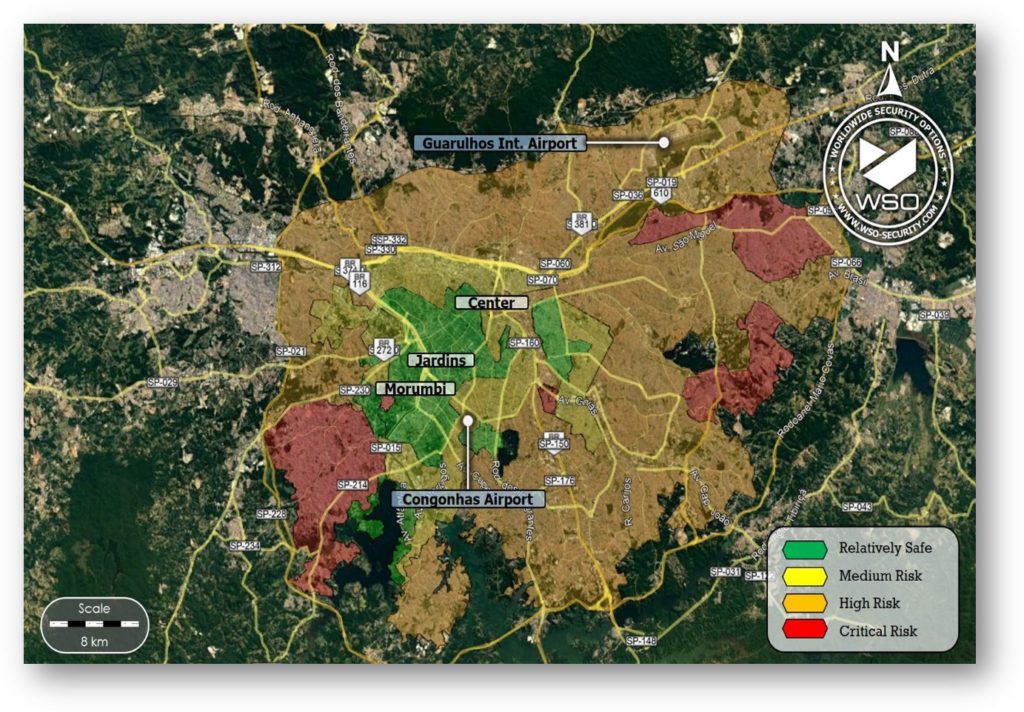
Transportation
For security reasons, public transportation should be avoided unless the user is familiarized with the said network and the city in question. If possible, for all itineraries resort to reputable secure transportation services, especially for business and high-profile related-visits. Taxis may be used provided they are recommended by the largest hotels. Please be advised that some taxi drivers might attempt to take advantage of foreign passengers to inflate the price of the trip. Use ride-sharing apps before using a regular taxi on the streets.
The main routes are modern and remain in good condition. However, this is not necessarily the case for secondary and rural routes, which could potentially present heightened security risks, especially while traveling during dark hours or under poor visibility. Therefore, if traveling by land, do not deviate from primary thoroughfares. As a rule of thumb, it is best to avoid routes removed from central localities and which remain in poorer circumstances. While driving in the cities, make sure to avoid detours through risks areas such as favelas.
Health and Sanitary Conditions
It is recommended to vaccinate against yellow fever, tetanus, hepatitis A and B, and typhoid. Taking into account the tropical weather, it is very important to wear protection against bugs and avoid leaving body areas uncovered to mitigate the risk of suffering insect and mosquito-borne diseases such as dengue, the Chagas disease, and the Zika virus. These precautions should be followed at all times while entering remote and jungle areas. The quality of tap water in Brazil is generally good. However, this might not be the case in remote or jungle areas. As a precaution, it is therefore recommended to drink sealed bottled water while visiting or staying in such areas.
It is not advised to travel without international health insurance covering emergency medical evacuation to the country of origin.
Take essential health precautions to mitigate the risk of contracting diseases or viruses. Carry masks in crowded places such as airports and maintain rules of social distance and avoid contact with surfaces of common use in public places. Always carry hand sanitizer.
Tactical Recommendations
Exercise vigilance and situational awareness throughout the trip to Brazil.
We recommend procuring private transportation services for business and high-profile trips. For the latter consider adding executive protection services. If private transportation is unavailable, use taxis vetted by the main hotels or ride-sharing apps. Avoid public transportation if not sufficiently familiarized with the city.
Minimize travel through high and critical-risk areas. In urban areas avoid all-travel to favelas. Furthermore, avoid non-essential trips to remote or jungle areas removed from the main localities.
While traveling by car avoid all detours that might lead to potentially dangerous areas. If possible, stopovers should be planned ahead with the support of a local security contractor, especially if travel outside the largest cities is required. Check GPS services to ensure they pinpoint routes connecting through major thoroughfares.
Avoid carrying large sums of cash or valuables during the trip. We advise against wearing or carrying items in public that may give the impression of economic affluence and which could attract unwanted attention from criminals.
Avoid traveling in sport or luxurious cars which could attract unwanted attention from criminals.
Do not resist armed robbery attempts. We recommend to always carry a few 100 BRL bills for duress cases, specifically to appease criminals looking for easy money.
For security reasons, minimize travel during night hours, especially beyond the main commercial and residential areas. Avoid public spaces such as parks and beaches during the dark hours.
We recommend lodging in reputable establishments and hotels with private security. In Rio de Janeiro, it is best to stay in Flamengo, Botafogo, Copacabana, and Leblon. In São Paulo, it is best to stay in Bela Vista, Jardins, Itaim Bibi, Vila Olímpica, and Morumbi.
Avoid the vicinity of every kind of political demonstration or rally in urban areas. Peaceful protests can be infiltrated by violent elements.
Take all necessary precautions to mitigate the risk posed by insect and mosquito-borne diseases. When visiting remote locations drink sealed bottles if the quality of tap water is questionable.
Emergency Contacts
Police: 190
Ambulance: 192
Fire: 193
WSO Global Command Center: +1 956 467 4858 / gcc@wso-security.com
Security advice and assistance over WhatsApp: +593 99 461 1128 / +521 81 1511 3166







